
PRESTIGE EDITION THIRD EDITION
QULTURE For The

TO SEE THE FUTURE
TO SEE THE FUTURE
We must be not afraid
We must be not afraid
To stare into the whims of destiny and fate
To stare into the whims of destiny and fate
To envision our paths that we alone create The life we breath molded into shape
To envision our paths that we alone create The life we breath molded into shape
An original form that is often imitated
With a style and grace that could never be replicated
An original form that is often imitated With a style and grace that could never be replicated
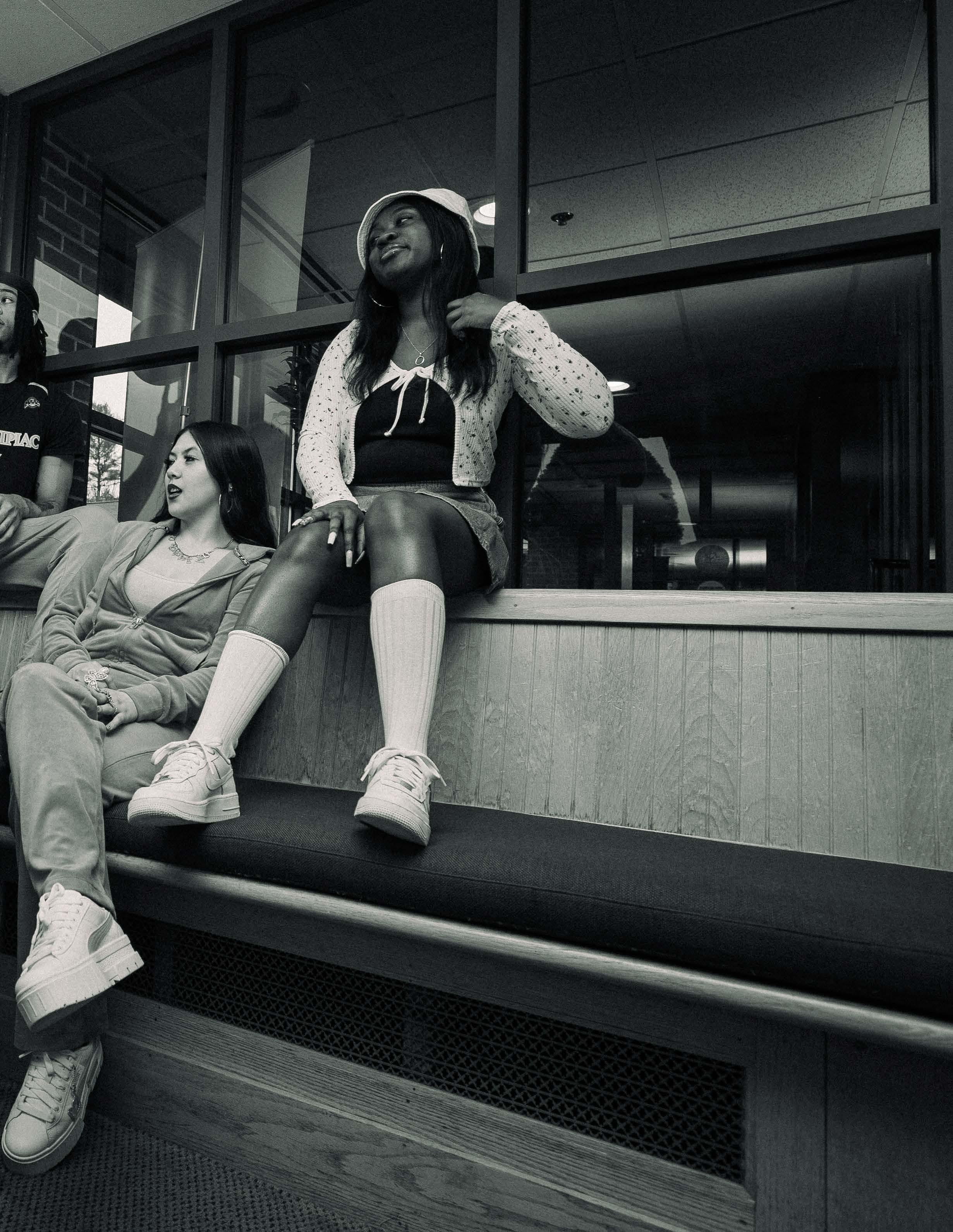
THIS ... IS THE QULTURE
THIS ... IS THE QULTURE
- Ja’Sean Johnson-Henry
- Ja’Sean Johnson-Henry






Student ORganizations 1 Roundtable Discussion 25 Greek Life 17 Day in the Life 27 Faculty feature 21 Fashion Show 31 Contents
Credits
EXECUTIVE EDITOR
David Matos
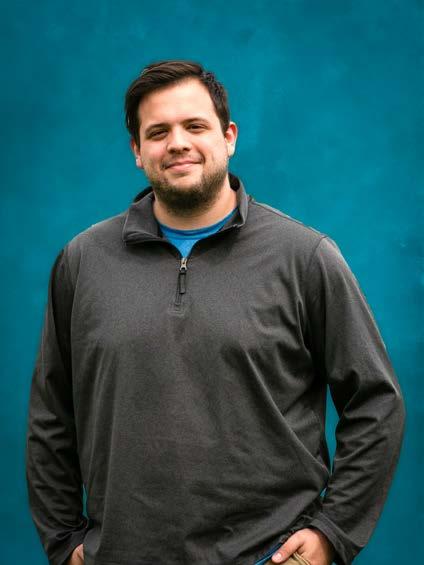

EXECUTIVE & FINANCIAL DIRECTOR
Hallye B. Boughner
DIRECTOR'S ASSISTANT
Donald Pressley
PHOTOGRAPHERS
Daniel Passapera
Peyton McKenzie
Yamini Dalal
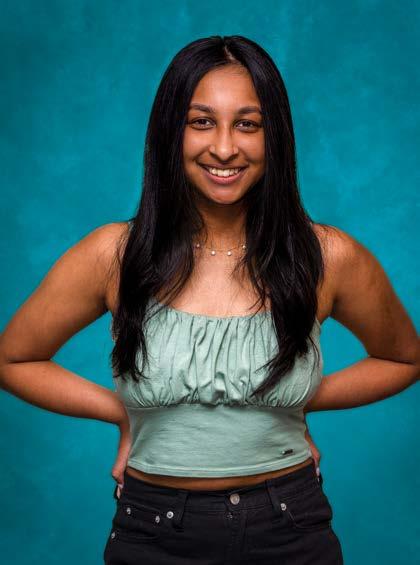
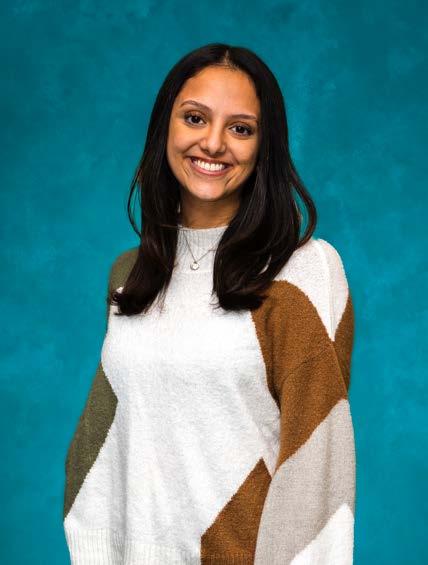
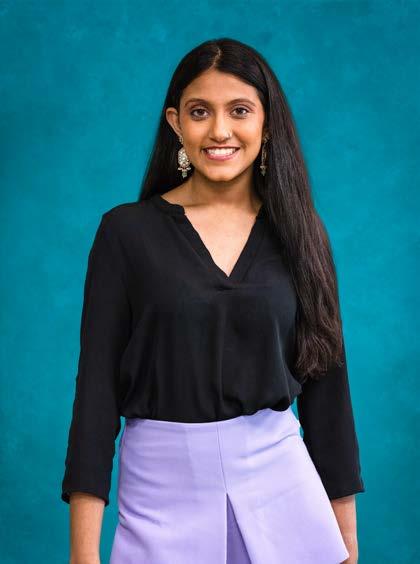
Armaan Rochlani


ROUNDTABLE FACILITATOR
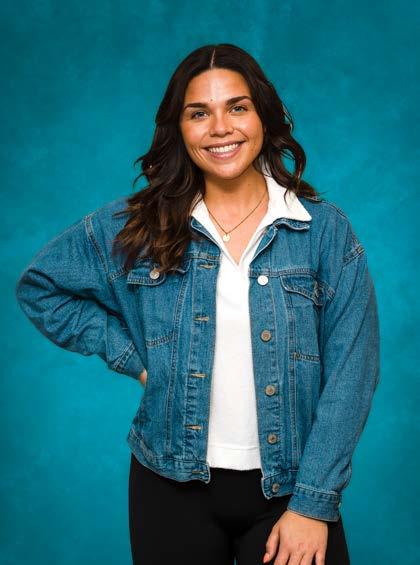
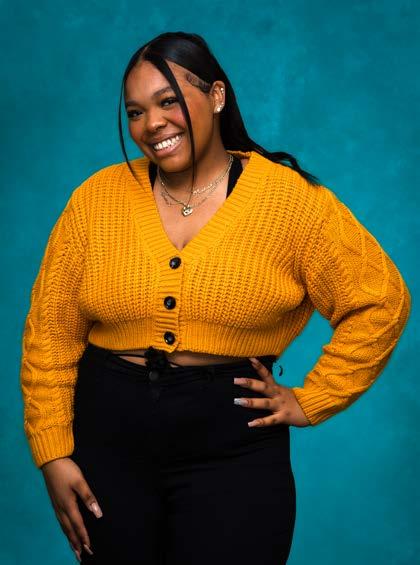
Christiaan McCray

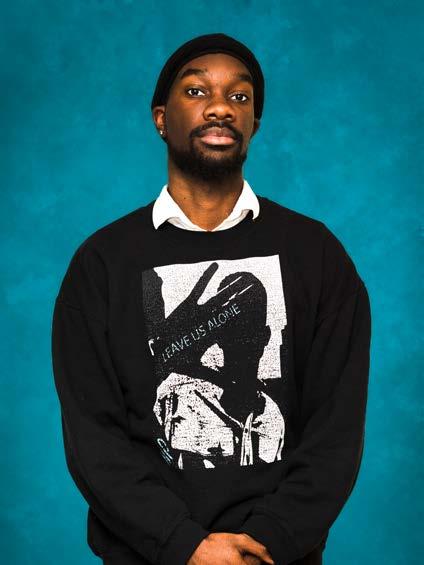
WRITERS
Averial Evans


Aidan Sheedy
Melina Khan
Nicole McIsaac
Neha Seenarine
LAYOUT
Peyton McKenzie
Multicultural Student Leadership Council
By: Melina Khan
As an international student, Anesu Mhene, a senior legal studies major, already had an interest in diversity education when she began at Quinnipiac University four years ago. When she struggled to find a multicultural student organization that connected with her, a professor referred her to the Multicultural Student Leadership Council.
“Before joining MSLC and finding out about it, I really hadn’t found one org that clicked with me and resonated with my identity and my experiences,” said Mhene, MSLC’s president. “I really just love the idea that MSLC brings together all the multicultural orgs.”
MSLC is a leadership body representing that represents 15 multicultural organizations at Quinnipiac through advocacy, awareness and events. Mhene said she appreciates
that the organization promotes appreciation of all backgrounds, rather than honing in on one culture.
“It’s not really focusing on one specific thing, but we can kind of take different parts of different cultures and highlight them whenever it feels relevant and necessary,” Mhene said. “That’s really what made me want to learn more about other cultures, and also just be able to participate in a way that wasn’t exclusive to what I identify with, but also be able to understand other people’s cultures and perspectives.”
Mhene said MSLC’s work primarily focuses on building awareness of the multicultural organizations on campus. Because Quinnipiac is a predominantly white institution, Mhene said many students aren’t aware of the work of these groups.
“The people that are part of the
multicultural organizations are very passionate, and go to the events, (but) outside of a certain sphere of people, there really is limited cross-cultural interactions,” Mhene said.
To promote such interactions, MSLC hosts various events throughout the year to unite and bring students and multicultural organizations together. On March 23, MSLC hosted Culture Night, which gathered all the groups for food, trivia and dancing.
“When you have something that’s just a culture night that’s not really pertaining to one particular culture, (it) can really make it a little bit less intimidating for somebody that’s not really sure about different cultures (or) they haven’t really been exposed to that from their previous background,” Mhene said. “So I think that’s one thing that helps having the (MSLC).”

1
African & Caribbean Student Union
By: Averial Evans
This year, Quinnipiac University’s African and Caribbean Student Union have been hard at work creating new events for students and members to learn more about the cultures they represent. However, this year’s executive board has not only helped educate others, but have also learned more about themselves through putting on these events.
“I think that this organization had a huge impact on me,” said Anna-Beth Haye, the president of ACSU. “It really made me appreciate a leadership role. It made me realize that I really do enjoy being in a leadership role and made me want to be in something like that after college.”
As working with other members, Haye, a junior journalism major, appreciates her role as president as it has helped overcome personal challenges.
“It helped me with my people skills,” Haye said. “I have really bad
anxiety sometimes and this org forced me to, you know, talk to people and get to know people.”
Autumn White, the event coordinator for ACSU and a first-year criminal justice major in the 3+3 law program, believes her position and the role she fills in the multicultural organization helped with her confidence and helped her bond more with her culture and family.

“I think prior I lacked certain confidence to believe I could lead and be a good representative for myself but also my family … from this organization I gained more confidence, better communication skills, and deeper love for my culture.” White said. “I enjoy going home to be with my grandparents and tell them how this organization has encouraged me to learn more about our Cuban and Panamanian heritage.”
Other executive board members have found that being a part of ACSU
has helped them move out of their comfort areas and into new territories.
“This group has greatly benefited me by enabling me to move beyond my comfort zone and actually talk to people, promote events that we conduct, and be more outgoing,” said Leila Celisie, ACSU’s public relations chair and interim vice president.
“I do remember that in a group assignment in class, I stated that I was on the ACSU e-board,” said Celisie, a sophomore health science major. “When one of the group members asked about it, I was able to give a brief description of what it is and what we do. I was really pleased of myself.”
As for the future of the organization, Haye is ready to continue and strive for more.
“Representation and inclusivity is our number one goal and we’re just getting started,” she said.
2
Asian Student Alliance
By: Neha Seenarine
The Quinnipiac University’s Asian Student Alliance “strives to break the barriers between different cultures within Asia” per its Do You QU through the different events it hosts on campus.

The organization recognizes Eastern Asia, the Philippines and other regions.
Jinxia Lin, co-president of the Asian Student Alliance, said one of the organization’s main goals is to celebrate Asian culture.
“ASA is very inclusive, and you don’t have to be Asian to join,” said Lin, a junior biology major. “We’re all about providing an environment where we’re supportive, and we’re
there for you whenever you need us. Anyone who is interested in learning, or just like trying out new foods, or, you know, trying out new activities are all welcome to come and see where all that we’re all about.”
Lin noted the low population of minorities on campus. Although Quinnipiac is implementing different cultural events within the dining programs — Lin discussed how multicultural organizations bring another sense of community.
“(We) encourage people to attend to really make you feel like home,” Lin said. “A lot of the times I see in dining (that) they’re trying to incorpo-
rate a lot of new stuff. But you know it’s just sometimes not the same, so we try to bring as much of our culture here as possible.”
Lin discussed the impact that the Asian Student Alliance has made on her. It has allowed her to meet new people that share the same culture.
“I definitely think that’s where I made all of my friends,” Lin said. “I’ve known them all through ASA, like with the entire e-board like I’ve been on for two years, and I think it provides me an environment where I can relate to and talk to whenever I feel a certain way, either with, you know, family issues or academic wise.”
3
Indigenous Student Union
By: Aidan Sheedy
Quinnipiac University’s Indigenous Student Union President Aiyana Baker has known who she is since day one. Her grandfather engrained the pride and power of the Mohegan people into her as a little girl as she would attend pow-wows and then feel excited enough to share with anyone she could the next day at school about her traditions.

Unfortunately, Baker’s grandfather, Bill, died in her senior year of high school. But it is through her work in the ISU that carry on the values he set for her to spread in the world.
“He was my biggest connection to my drive,” she said. “He always kept me wanting to learn more about my culture. He was always so proud of it.”
That want never stopped, but it did hit the wall after Baker started college at Quinnipiac. The sophomore nursing major was met with a scarcity of people like her as soon as
she entered her first year. In comparison to the freeness she felt back home, she knew this was going to be an adjustment.
“When I first came here, I knew about my background, but navigating it at such a big space can be hard for a lot of students,” she said. “Being at a predominantly white institution, I think a lot of people don’t know about other ethnicities and it kind of makes us all feel lost.”
And thus, Baker found it hard to embrace her identity for the first time.
“Coming from a small town, I knew nobody coming here, so it was hard for me to share that side of me with people,” she said. “(ISU) has helped me dig even deeper into my culture.”
The University itself was built on indigenous land which belongs to the Quinnipiac tribe of the Algonquian peoples of the northeast region. This
is an initiative ISU is working on. Baker said she hopes to have a land acknowledgment come from the university soon.
“I feel like so many students don’t even know that we are on Indigenous land,” she said. “That’s really sad.”
That’s why Baker stands today as president of ISU. She wants all students to feel comfortable in their own skin, as well as aware of the rich intersectionalities that surround us. Baker has used this opportunity as an organization leader to educate the Quinnipiac community about its own history, including Indigenous student voices and embrace the diversity that exists across Indigenous communities not just locally, but worldwide.
“The organization makes it easier for me to share,” she said. “It’s about getting the organziation on its feet and being able to become something bigger than Quinnipiac (University).”
4
Black Student Union
By: Averial Evans
The Black Student Union is known for holding some of the biggest events on campus. From annual spring fashion shows showcasing local and even student brands to annual suit and tie events like the Excellence in Ebony Gala held every fall, who are the students behind these largescale events?
Students during the day to student leaders by night, some of this year’s executive board members for the Black Student Union, like BSU President Deja Banner, a senior behavioral neuroscience major, have a clear mission for the organization. Besides the want to promote black excellence and safe spaces on campus, she hopes for a legacy.
“My hope is that BSU continues to thrive and can live on and leave a legacy and an imprint in Quinnipiac’s community,” Banner said. “Because a lot of the multicultural orgs get overlooked.”
In the wake of wanting to leave that legacy and an impact on the QU community, the organization has already done so by first leaving its mark on those in executive positions.
Emma McDonald, a sophomore nursing major and BSU treasurer, says how her leadership position helped her further understand personal feelings about fitting in.
“I found as a member in the BSU especially as a biracial person who felt like I was never enough of one race, that the leadership role and representative power in a multicultural org has been helpful personally in learning more about myself,” McDonald said.
Other executive board members, like Hallye Boughner, a sophomore nursing major and director of public relations for BSU, believe that her role in the organization has allowed her to learn and express herself, ideas and leadership style.
“It has allowed me to find my leadership style, and truly embody my values,” Boughner said. “BSU has provided many opportunities to express myself creatively by allowing me to voice my ideas for events. My position as director of public relations has been a creative outlet to show my abilities with graphic design.”
As the multicultural org has helped these students find their voice, they hope to echo this sentiment to their members and the Quinnipiac community.
“We’re a very welcoming community,” Banner said. “We want everyone to feel included, we don’t want anyone to feel left out or excluded. We want everyone to know your opinions are heard and you matter.”
5



6
International Student Association
By: Melina Khan
Of Quinnipiac University’s nearly 2,000 first-year students, less than 2% hail from outside the United States. This disparity is what drives the International Student Association’s mission to foster a community for international students on campus.
“(ISA is) a space where you talk about all these weird things that may not appear weird to the local person, but as an international student, you feel different or you feel like you don’t fit in,” said Hephzibah Rajan, ISA’s president. “And so it’s that kind of community where you can just talk about it and feel like everyone else understands what you’re going through.”
The sense of community within ISA was what drove Rajan, a senior
computer science major, to join the club as a first-year.
“It really was home away from home,” Rajan said. “I met a lot of people that I have called friends within this club, and while a good chunk of them have also graduated, they’ve stayed friends. And I think just having that connection was the reason I initially joined.”
Aside from cultivating connections among international students, ISA aims to raise awareness about diverse backgrounds on campus through various events throughout the year. Most recently, ISA hosted an International Film Award night on March 25 at On the Rocks Pub to spotlight films from around the world.
These events spotlight aspects of other cultures students may not be aware of, especially at a predominantly white institution like Quinnipiac. Genesis Iscoa, ISA’s vice president, said education is an important aspect of bridging the divide between international students and students from the US.
“There aren’t spaces to really talk about how differences can put us back,” said Iscoa, a senior political science major said. “To be in a room with other people who face those kinds of same differences, it doesn’t just allow you to empathize with others, but also to seek out creative solutions to those kinds of issues, rather than just be ostracized and feel isolated.”

7
Latino Cultural Society
By: Neha Seenarine
Mi casa es su casa — it’s a common phrase in Latino culture. However, this statement is something more to the Quinnipiac University’s Latino Cultural Society stands by. The organization focuses on welcoming students and making them feel like it’s a home away from home.
“If there is one thing that I would say about LCS is it’s really like my house is your house,” said Genesis Paulino, the vice president of the Latino Cultural Society. “It’s about expressing and having a piece of home for us as Latinx students here in a predominantly white institution. But, also we are able to share that space with other students of color, who are also
looking for a home.”
Latino Cultural Society President Emily Diaz and Paulino, a junior sociology major, both reflected on Latino Cultural Society’s mission and what they want the organization’s big picture to be. Diaz said the organization is focused on connecting.
Diaz, a junior political science major, explained that her and the Latino Cultural Society executive board meet weekly and before discussing organization topics — they sit together and talk about what they’re grateful for and their highs and lows.

“We’re people first before anything else,” Diaz said. “We love this org and we love the advocacy
work that we do within it, but at the same time, we are people, and we understand how overwhelming it can be to be a student at a PWI, but also just a college student.”
Paulino acknowledged the space that the Latino Cultural Society is creating on campus outside of the organization’s executive board.
“I appreciate the spaces that we’re creating, and who recognize that LCS is much larger than just ,you know, the nine people on an e-board,” Paulino said. “It’s much larger. It’s the greater mission of creating an open and safe space for Latinx students to be able to feel represented here at a PWI, but also for other students to encourage other students to also find that space.”
8





9
Juvenile Urban Multicultural Program
By: Nicole McIsaac
Wrapping up its first chartered academic year as an organization on campus, Quinnipiac University’s Juvenile Urban Multicultural Program has hit the ground running.
Originally founded in 1991 at Binghamton University in Binghamton, New York, the organization seeks to support high school students overcoming educational obstacles and introducing them into a higher educational setting.
Alondra Santos de la Cruz, a junior diagnostic medical sonography major and president of the Quinnipiac chapter, said her inspiration to introduce J.U.M.P to Quinnipiac came after conversing with her cousin who is part of the upstate New York organization. After leaving a diverse population and coming to a predominantly white institution, Santos de la Cruz said she was looking to surround herself with individuals of the same background while fulfilling her personal passions for herself and her community.
“That conversation with her is what really fueled me to bring that here and fulfill that vision for not only myself, but for the campus,” Santos de la Cruz said.
J.U.M.P works directly with middle school students who are underserved and underrepresented in their communities to push past educational barriers.
“Jump Nation strives to make sure that these students have a well rounded view of the world,” Santos de la Cruz said. “What they could be or can’t be, or what they want to be or don’t want to be.”
In their provisional year on campus without an organizational budget, J.U.M.P. has made strides in the community by visiting Amistad Academy Elementary School in New Haven, Connecticut. Creating an engaged environment for students to “soak information in,” the first of many community efforts focused on the topic of conflict and resolution.
Looking toward the future of the organization, Santos de la Cruz said she hopes J.U.M.P. can reach the surrounding areas of Quinnipiac and beyond.
10
Minority Association for Pre-Medical Students
By: Aidan Sheedy
If you’re a pre-medical student at Quinnipiac University, chances are you’ll find many others just like you. But for people of color, navigating college without someone who looks like you can be challenging. That’s where MAPS comes in.
The Minority Association for Pre-Medical Students (MAPS) is a student organization that operates under a parent organization, the Student National Medical Association (SNMA). SNMA is a non-profit committed to supporting current and future underrepresented minority medical students and addressing underserved communities’ needs.
Ariba Chaudhry, a junior double-major in biology and behavioral neuroscience, currently serves as president of MAPS. She wants students to know that the mere existence of this organization can help students in numerous ways, and MAPS actually helped as a first-year herself.
As a Muslim, Chaudhry observed Ramadan last year. This holiday, according to NPR, is the most sacred
time of the year for Islamic people and strictly encourages practicing Muslims to fast every day for the month from sunup to sundown. The fast also prohibits sex, alcohol and smoking.
During that time, Chaudhry struggled with keeping her academic and personal schedules separate. But, she said that with help from some MAPS executive board, she found solutions to a conflict most professors don’t think about.
“I remember in freshman year, I was having a tough time juggling that and handing in my lab reports on time,” Chaudhry said. “I wouldn’t have had the courage to do that on my own.”
Chaudhry’s club partner in crime, Krithi Goud, also felt unsupported when beginning her medical degree journey. But for her, it was not an adjustment exclusively.

“For me, my family grew up in a different country,” the junior behavioral neuroscience student said. “They came here and I was born here so we’re all kind of learning this together and
it helps to have similar people, and similar backgrounds to get that information from.”
Goud said it was sometimes hard to keep your life flowing on the same page. But MAPS is here to help in the STEM and pre-medical fields.
“Being in science, you have to balance a lot of different things and it’s really important to take time for yourself,” Goud said. “In high school, I feel like you have all these guidance counselors … that can guide you along the way, but here, it’s hard to get meetings with certain advisors.”
MAPS also knows the university can’t do everything at once and run all programs perfectly, so the team said they act more like student ambassadors or guidance counselors because it is true that the school needs personnel to help out.
“Not one person knows everything,” Goud said. “So it’s nice to have the student perspective so we can also help one-on-one and give (a student) the real information they need.”
11
Muslim Student Association
 By: Aidan Sheedy
By: Aidan Sheedy
In a suite draped in tranquil décor, colorful lights and religious deities, it hosts arguably the most tight-knit group of student leaders on the Quinnipiac University campus.
Supported by a cast of students of many ages and beliefs, QU’s Muslim Student Association is the epitome of what teamwork looks like in a student organization. With executive board members covering all four undergraduate classes, the MSA has built a foundation for strong student leaders to emerge in the future.


“We have different ethnicities, different cultures, looks, appearances, and skin color,” senior biology major and MSA President Abdullah Farid said. “We have a pretty good establishment, and going forward, whoever takes over can ultimately keep improving on the small things.”
About five years ago, the MSA “suite” was in a minuscule makeshift office space now known as the student employment office, located on the second-floor divider between the student center and Tator Hall. Today, the group resides across the hall in another tight space, but they have decorations and
really made it their own.
“This room doesn’t have a single purpose,” Rias Ras, a first-year political science major said. “Because we have such a small room, we try to do the most we can. So this room is decorated for prayers, but also for meetings and socializing.”
According to India Times, there are five obligatory prayers that Muslim people must act in throughout the day called Salah. Because of this, many Muslim students at Quinnipiac had no private spaces to go to complete these rituals in privacy before the MSA prayer space was erected.
“We’re trying to implement an institution like Quinnipiac to promote religious liberation on campus,” Farid said. “We have a church and a synagogue, but we don’t have a proper mosque set up for (Muslim) students.”
This drove Farid to advocate harder for accessible expression of the Muslim faith at Quinnipiac.

“We always felt under the radar as a minority, but also a religious belief that was not recognized on campus,” Farid said. “That also has helped me
with leadership and working hard.”
Farid’s leadership has not only helped him grow, but it has encouraged others to do the same. Jasper Paul, a first-year Radiologic Sciences, grew up in a devout Catholic household but wanted to expand her horizons and try something different.

“This organization means everything to me. Coming here as a freshman, this was a place where I could be myself because at home I really can’t,” Paul said. “This is where I can learn all about the religion and these people are my biggest supporters. They’re family.”
At a predominantly-white university with abysmal diversity ratings currently standing at 81.1% white, it’s important to the MSA that they are a part of the positive changes and the future of the university.
“It’s a very strong thing to show awareness that our beliefs are not what many people think they are,” Ras said. “The only way Quinnipiac is going to be more diverse is if they’re welcoming and accepting to everybody and the students have to feel like it’s their home.”
12
Naturallyme
By: Melina Khan
Modern beauty standards project straight hair as the norm, especially for women of color. Black women with natural hairstyles are perceived to be less professional and less competent than their counterparts, according to a 2020 study in the Social Psychological and Personality Science journal.

Samaia Barton-Faucher, the president of Quinnipiac University’s NaturallyMe organization, grew up familiar with the social expectations of having “calm” hair.
“I was definitely pushed into the culture of having my hair straight,” said Barton-Faucher, a junior behavioral neuroscience major. “It was kind of like, ‘oh, keep your hair calm,’ which was considered straight instead of having your poofy hair out, or an afro or something like that.”
Before coming to Quinnipiac, Barton-Faucher straightened her hair frequently and neglected to embrace her naturally curly hair. It wasn’t until she got to college that she learned how to properly take care of her hair, thanks to NaturallyMe.
NaturallyMe is a student organization that aims to educate and inspire students about natural hair, especially curly and coarse hairstyles.
Daisy Owusu Nsafoah, NaturallyMe’s vice president and a junior biochemistry major, said the organization welcomes all backgrounds when it comes to hair and skincare.
“I feel like NaturallyMe is a safe space where people in general, anybody at all, can come and feel safe and embrace themselves for who they are, and not feel left out,” Owusu Nsafoah said.
One of the ways NaturallyMe promotes education of natural hair and skincare is through events on campus. On April 21, the group hosted “Curl Con” on the Quad, which will consisted of lawn games, free food and prizes.
Overall, Barton-Faucher encouraged students to join NaturallyMe to begin the journey of self- care.
“It’s okay not to know necessarily what you’re doing with your hair or your skincare, or you don’t know how to start this journey,” Barton-Faucher said. “We’re always open to answering questions or sharing our experiences because ultimately, at the end of the day, we all started at point one, so it’s okay not to know, and we’re here to share those experiences with each other, and grow together.”
13
South Asian Society
By: Neha Seenarine
Students can find Quinnipiac University’s South Asian Society putting on multiple events throughout the academic year, from celebrating Diwali to a Bollywood Fest featuring dance performances. In addition, the organization welcomes anyone from the Quinnipiac community to celebrate South Asian culture.
“Even if you’re not South Asian, you’re welcome to come,” said Kripa Patel, the president of South Asian Society. “ It’s not just for people that are in South Asian Society, and I think that makes people more comfortable coming more and more; we like (to see) a diverse audience every time.”
Kripa Patel, a senior health
science studies major, said having community members participate in South Asian Society’s events allows them to learn more about the culture.
“Our goal is to not exactly teach people like (teaching) in the classroom, but have people participate and join us in the events that we host and in our celebrations,” Kripa Patel said. “In that way, they learn a little bit about our culture, because I also do think a lot of times, for even for multicultural orgs here, that there’s a misconception that it’s someone else’s job to teach someone else.”
South Asian Society Vice President Megha Patel described coming to the organization’s events as a way
to embrace South Asian culture.
“If you were to come to our movie night, you’d see (our culture) through cinema, or if you were coming to Garba or Diwali, you’d see (the culture) through the various folk dances,” said Megha Patel, a senior accounting major.
The South Asian Society allows members to practice their cultural traditions when students are away from home.
“It’s important if you’ve grown up dressing in cultural clothes, and dancing and things like that — If there’s a way for you to continue that through an organization, I think that makes people really happy,” Megha Patel said.

14

15
Sawhney Leadership Fellows
By: Averial Evans
The Sawhney Leadership Program is known to create opportunities and expand leadership development among the students in the program. This year’s participants, also known as fellows, believe their experience has strongly influenced the growth of their leadership styles for their respective career paths.
“It has taught me a lot of great leadership skills and has further prepared me for my path to being a lawyer, including in the aspects of public speaking,” said Chizahra Murphy, a political science and law in society double major.
Murphy also accredits the program to benefiting her academic and social college experience.
“I am now surrounded by like minded multicultural individuals and I am able to relate to them and bond with them,” Murphy said.
Others, like Anesu Mhene, a senior legal studies major, find the skills she learned can apply more broadly in other aspects of her life, not just in her leadership roles on campus.

“After learning about emotional intelligence and its importance, I have found myself to be more understanding towards my peers and coworkers, which has helped me create more positive relationships,” Mhene said.
Cecil Huang, a graduate student in the occupational therapy program, believes the program has helped build her confidence personally and professionally in advocating for others in her career field.
“It made me, helped me, build up my confidence and what I can do one day,” Huang said. “So for me, you know, to like working in a hospital kind of just learning how to advocate for others, advocate for other patients and clients.”
Khushi Dagli, a junior health sciences major in the entry-level master physician assistant program, believes the leadership program has allowed him to work through and overcome certain feelings of not belonging in academic spaces.
“I think academically it has made me realize more about the imposter syndrome and accepting and escaping it now. It was eye-opening to see the other group members also go through it and work through it in a way that is truthful but also remain competent,” Dagli said.
Through his experiences within the program and seeing his peers go through their own trials, Dagli has been able find and picture himself as a leader.
“It has made me realize that I am a leader which is hard to recognize,” Dagli added. “You do things and learn things in roles you pursue but it’s hard to picture yourself as a leader and that is what the program has helped me with.”
16
Greek Life
Alpha Kappa Alpha Sorority Inc.

“I joined AKA because of the social impact that members leave on society. The women of Alpha Kappa Alpha are strong leaders that advocate for equality and social justice, which aligns with my personal values. In my experience, I have learned to be more confident in public speaking, and allows me to continue to strive for positive change. Being a part of Greek Life, it has allowed me to get over my anxiety and be more confident in myself.”
NIDERAH JAGGAN
Political Science Major, Public Relations Minor; Sophomore Alpha Kappa Alpha Sorority Inc.

17
Lambda Theta Phi Latin Fraternity, Inc.




18
Greek Life
Zeta Phi Beta Sorority, Inc.

“From my perspective, Greek Life is being a part of a community of likeminded individuals with priorities beyond themselves. I decided to be a Zeta because I was drawn to the emphasis on providing service to vulnerable communities. Through my experience, I have grown as a leader, connected with members of various different organizations, collaborated on major projects, and placed into spaces and positions that I would have never imagined myself partaking in. At Quinnipiac, I have had the opportunity to fully immerse myself into the community, and host several service projects.”
DAISY ZAPATA
Biology Major, Minor in Global Public Health; Senior Zeta Phi Beta Sorority, Inc.
19




20

21
Dr. Khalilah L. Brown-Dean
At Quinnipiac University, she is the associate provost for faculty affairs. She is a political science professor. She hosts a radio show and podcast for CPR. She gets honored — a lot — most recently by Diverse Magazine as one of its 25 most influential women in higher education.
But how does she do it all? Her commitment to her community and passion for political science and identity politics all began in her hometown of Lynchburg, Virginia.
A SHINING VOICE IN HER COMMUNITY
Brown-Dean is a Southern girl, having grown up in the Bible Belt of the South, where socially conservative Protestant Christianity plays a prominent role in society.
By: David Matos
Lynchburg is also the birthplace of Jerry Falwell Sr., an American Baptist pastor, televangelist and conservative activist, and Liberty University, the world’s largest evangelical university known for starting the moral majority movement, which sought to infuse religion into politics.
Brown-Dean never entirely fit into the status quo of the ideologies of her hometown but it did teach her the importance of advocating for innovation and the community as a whole.
“In some ways, I totally did not fit in that space at all,” Brown-Dean said. “And in other ways, everything that I am is because of where I came from.
“It taught me what it means to be an outsider. It taught me what it meant to build community with intention. And it taught me about the responsibility that we have wherever we find ourselves in life, the responsibilities that we have to the community and to give back.”
‘I’m driven by purpose’: QU Professor and Associate Provost Khalilah
L. Brown-Dean speaks about her commitment to community and passion for access to democracy
22
Brown-Dean gave her first public speech at eight years old when the city council wanted to put a fire station in the middle of her neighborhood.
Because her family taught her that she was responsible to her community, she wanted to speak on behalf of the kids because adding the fire station would mean that they would take away their playground, raising the question, “What about us?”
“I come from a family that is very community-engaged since birth,” Brown-Dean said. “We were taught that you have an obligation to community and, however, you define community, if community is family, it’s your neighborhood; however, you define community, there’s a connection there.”
Brown-Dean explained that two words she would use to describe herself are “committed” and “unapologetic.”
She said that commitment had followed her through every aspect of her journey, not just her professional life. She’s unapologetic because, during much of her life, people often told her that she wasn’t good enough, didn’t fit in or wasn’t what people expected.
“I’m a very passionate person,” Brown-Dean said. “I’m driven by purpose … I’ve always shown up in spaces where people didn’t think I belonged. And I’m at the point of being unapologetic of not apologizing for or feeling less than
because of someone else’s limited view of what’s possible. It’s a long time to get there. It’s not easy to be there. But I think it goes back to the commitment because I think the calling on my life, the purpose of my life, is bigger than naysayers.”
Brown-Dean said her family has collectively been great role models in her commitment to education and community.
Her grandfather, for example, dropped out of school in sixth grade to help care for his family. Although he didn’t have a formal education, he worked hard every day so his children, grandchildren and great-grandkids would have access to education.
“What do I have to complain about?” Brown-Dean said. “I didn’t have to go into the field and work all day. I didn’t get pulled out of school to care for a family. So my family, collectively, keeps me grounded. When things seem overwhelming, they remind me what matters.”
Aside from Brown-Dean’s family, poet and author Maya Angelou is a significant inspiration for her, and his poetry got her through some of the most challenging moments. Growing up, Brown-Dean often read Angelou’s poems while competing in public speaking and pageants for scholarship money.
“I was able to pay for and go to college because of her work,” Brown-Dean said.
Her guidance counselor once told Brown-Dean that she wasn’t college material.
“I believed her, I felt like she must know what she’s talking about,” BrownDean said. “I’m a first-generation kid; if she’s telling me this, why try? And I realized not only was she wrong, but it was dangerously wrong. It was the impact of telling kids that they don’t have worth and they don’t have a future.”
However, that didn’t stop her from pushing forward and exceeding expectations in her journey as a professional and community leader.
“But I carry that as a reminder of what’s possible,” Brown-Dean said. “I carry it as a reminder of how students like you who I can have in a class or read something they wrote and get inspired by them. And think about what we are created for the people in our labs now but for those yet to come.”
A SHIFT IN PLANS
Brown-Dean graduated from the University of Virginia with a bachelor of arts in government in 1998, where she spent her first three years as an undergrad preparing for law school. However, it wasn’t until three days before the start of her senior year that she decided that wasn’t want to do it.

While Brown-Dean was studying at Virginia, she did a community service drive to get more people registered to vote.
She recalls one gentleman from the neighborhood avoiding her table because he couldn’t vote, which was a groundbreaking idea for her then.
“I was naive,” Brown-Dean said. “I was like, ‘Oh come, it’s your civic duty as an American,’ and he kept saying, ‘I can’t vote.’ And again, naive and thinking, ‘Of course, you can. You’re 18; you can vote.’ Finally, he was so frustrated with me. He said, ‘I can’t vote because I have a felony,’ and just walked away. I was a government and politics major and had never heard of this. It didn’t make sense to me.”
From this experience, Brown-Dean learned about felon disenfranchisement, which meant that based on the state you lived in, you couldn’t vote if you had a felony, you couldn’t vote.
At the time in Virginia, if your check bounced, it counted as a felony, and you would lose the right for the rest of your life. For example, as a student, if you bought a certain number of textbooks with a check but the student didn’t have enough money in your bank account, and the check bounced, it would count as a felony, losing your right to vote indefinitely.
“In Virginia, it meant if you had a felony, you would lose the right for the rest of your life,” Brown-Dean said. “That’s what you did when you were 18. I’m not making any judgments, but I did some things at 18 that I don’t do now. Right? So the rest of your life didn’t matter what you did, didn’t matter. If you went to school and got a good job, it didn’t matter. For the rest of your life, the state of Virginia told you, you weren’t a full citizen.”
From this experience with the gentleman at the community service drive, she decided not to go to law school but instead get her Ph.D. in political science at Ohio
23
State University, graduating in 2003.
She became passionate about shifting access to democracy, including voting rights, civic engagement and punishment, which shaped her career as an educator and community leader.
“This experience with this gentleman who I didn’t know, never saw again, stuck with me and I would bring it up like my classes on American politics or my classes on public opinion,” Brown-Dean said.
“Because the message was Black and brown people just don’t care about democracy. They don’t care about politics. And so they don’t vote. It’s because they don’t care. And it overlooks the fact that people have fought and died in this country for the ability to do that.”
FROM COLLEGE GRAD TO EDUCATOR
This year marks Brown-Dean’s 20th year as a professor in political science and 12th year working at Quinnipiac. BrownDean said becoming a full professor has been a fantastic accomplishment in her career because only 4% of full professors are Black women, according to the National Center for Education Statistics.

Brown-Dean is only the fourth Black professor in Quinnipiac’s history
to be a full professor.
“Being a part of Quinnipiac, for me, has also been an amazing opportunity to stretch and to grow, to learn,” Brown-Dean said. “A lot of my work, whether I was a professor here or now working as associate provost, has also been about connecting Quinnipiac to the broader communities … helping to create those connections because the same way I think in my life that we have an obligation to give to others, I think as an institution of higher learning as a community of learners, we have that obligation as well.”
In 2019, Brown-Dean published her book “Identity Politics in the United States.”
In this pioneering book, she provides an engaging discussion of forms of politicized identity concerning citizenship and democracy in the U.S., such as issues on race, ethnicity, gender, sexuality and religion, making sense of the current political divisions in the U.S. In addition, the book allows the reader to understand the problems within the realm of identity politics, leading a pathway to a potential solution.
“At my core, I’m an educator,” BrownDean said. “But being an educator doesn’t mean that I think I have all the information or all the answers. My belief is, we’re all here to learn. And we’re all here to teach.
I’m a political nerd. I’m fascinated by all of it … what I argue in the book is that the very founding of this country is about identity … I wanted to sort of deconstruct public debate. Still, I also wanted us to think about a path forward. We can complain, we can disagree, but then what? And so I wanted that historical context, the current political space, policy space, to think about what meaningful democracy looks like.”
LEAVING A MEANINGFUL LEGACY
Brown-Dean hopes that her legacy is that she created opportunities and affirmed other people in the community. Her ambition lies not in her future job opportunities or the titles she earns but in how she made people feel and helped create something more significant than any of us with her commitment to the community.
“When I come to the end of my journey,” Brown-Dean said. “Whenever that comes, however, it comes. I want to be able to look back and say, ‘I made the most of every opportunity I had’ and ‘I learned from people that I was around and helped people feel connected and engaged and I helped us to understand not just to see each other, but understand and appreciate each other.’ That’s the connection for me, the people who poured into me and those I helped and supported.”
24
“I’ve always shown up in spaces where people didn’t think I belonged. And I’m at the point of being unapologetic of not apologizing for or feeling less than because of someone else’s limited view of what’s possible.”
Roundtable Discussion
Most Athletic
CHRISTIAAN MCCRAY
Roundtable Facilitator, Senior REIVEN DOUGLAS
Basketball, Sophomore
JASON BUDHAI
Soccer, Senior
AVERY JORDAN
Track & Field (Sprints/Hurdles), Sophomore
JASMIN WILLIAMS
Track & Field (Jumps), Freshman
DONOVAN BROWN
Tennis, Junior
HOW DID YOUR UPBRINGING INFLUENCE YOUR PARTICIPATION IN SPORTS?
Q:
Reiven: “My parents played a major impact with basketball, and overall success. My parents influenced my interest in sports because of their involvement in sports, and my father’s experience of being a collegiate track athlete. From a young age, both of my parents encouraged me to try different sports, like, swimming, tennis, basketball, and track. Eventually, my sister and I fell in love with the sport of basketball and they supported our dream by finding different programs, teams and coaches.”
Donovan: “It was a different experience because no one in my immediate family plays tennis, and it is not a very popular sport, especially in our community. But, my uncle is a coach in Baltimore, and he gave me my first racket and started from there.”
Jasmin: “My entire life, I have been playing sports, whether it was gymnastics or track. For the most part, my upbringing was sports. Sports taught me structure. Sports taught me the value of participation, dedication, and commitment.
Q: HOW DO YOU MAINTAIN A WORK/LIFE BALANCE?
Reiven: “It becomes a routine, and you get used to it after doing it for so many years. But recently, the mental aspect of being a student-athlete has been very important for me. So, I manage ‘burnout’ by taking advantage of my off days, which is one day a week. During this one day, I separate myself from the game. I won’t even look at a basketball or go to the gym. I do different hobbies that are outside of my sport, and refuel myself.”
Donovan: “It is tough, but it is definitely doable, if you take advantage of your resources often. It is all about how you approach it mentally.”
Q: WHY DID YOU CHOOSE QUINNIPIAC? DID YOU HAVE ANY HESITATION CHOOSING IT DUE TO THE INSTITUTION BEING A PWI?
Avery: “I chose Quinnipiac because of the nursing program’s high credentials of being ranked #20 out of 518 schools in the country. But, I was hesitant because it was a PWI, and I was scared of the culture shock I would experience. I

had more hesitation when I found out that there were only eight POC out of forty-six women on the track team.”
Donovan: “Originally, I was supposed to play at a D3 school in California, but my parents did not want me to attend. So, I came to Quinnipiac and I was not on a team. For the first two semesters, I was just a student, not a student-athlete. This was an adjustment because I was always used to saying “I am on a team” or just being a part and involved iwn something. I had to adjust to being one of the only black students, especially in my own living space.”
Jasmin: “I chose Quinnipiac for the 3+1
25
Bio Program and the team dynamic I saw within the track team. There was a lot of hesitation because I always wanted to attend an HBCU. I’ve attended a prejudiced school for my entire academic career and I didn’t want to relive those years. But unfortunately, racism, discrimination, and stereotypes exist everywhere.”

Q: WHO ARE YOU OUTSIDE OF YOUR RESPECTIVE SPORT AND WHAT ARE YOUR PLANS AFTER COLLEGE?
Reiven: “I am a woman of God, and a woman trying to grow her faith, which I take pride in finding ways to show
it. I strive to be a person of love and light. Outside of sports, I want to use my voice, whether it is helping others through their journey, and or lifting their spirits. I am passionate about mentoring others through Bible studies on campus. In the future, I want to coach women’s basketball. If not, I want to follow the journalism path and be a sports analyst or an anchor.”
Jason: “I feel like outside of sports, I’m an engineering intern. This past summer, I was working for a construction company in New York City. I’m a coach. I coach younger kids in Long Island from time to time. And I’ll say, I’m a man of God, too. Overall, I just
want to make my mom proud. I am not a first-generation student, but my mom went to college and dropped out. So, my siblings graduated and I feel held to a certain standard. I want to be like them, I just want to keep my head on the right track, stay focused and achieve what I came here to achieve. In the summer, I am playing semi-pro with USL2, and aiming to go pro, or I will stay on the engineering path.”
Avery: “Outside of track, I am a hardworking, energetic, passionate and disciplined person. After college, I strive to work in a hospital as a Nurse Practitioner in pediatric oncology.”
26
Alondra Santos de la Cruz
It’s not unusual for college students to take the time to figure out what they are looking to pursue in their careers. However, that decision came a lot quicker for one Quinnipiac University student.
Alondra Santos de la Cruz, a junior diagnostic medical sonography major, became a Bobcat while already having her mind set on taking up a career in radiology. However, upon being introduced to the medical field line of work through her family, it wasn’t until her high school teacher suggested she dabble in radiology that Santos de la Cruz unfolded her true passion.
“There is a lot more to ultrasound than what usually people think, which is pregnant women,” Santos de la Cruz said. “There’s a lot of vascular studies, musculoskeletal studies that you can get done, or surgeries that are ultrasound-guided.”
Originally born in the Dominican Republic, Santos de la Cruz made her way to the United States in 2012 by settling with her family in the Bronx, New York. After attending school in New York City for six years, she made her way to Connecticut.
When the decision came down to extend her education into college, Santos de la Cruz’s interest peaked in the courses and programs offered at Quinnipiac. She instantly knew this was what she was looking to do.

“It’s just really cool to be able to be a part of a diagnosis process and just be able to help people in that way,” she said with a smile, grinning ear-to-ear.
Despite having a solidified mindset on her studies, Santos de la Cruz’s
27 Day in the life
ultimate goals after getting certified are unlike many other students studying in the field – to open up her own practice that is accessible to all individuals seeking care.

“Testing is so important and imaging is so important, but a lot of people can’t afford it,” Santos de la Cruz said.
Given her experience in the medical field thus far, Santos de la Cruz reflected on times when patients expressed anxiety over paying for necessary tests and screenings. This experience is one of the driving factors for her ultimate dream.
“There’s a lot of women who are pregnant, don’t have insurance and can’t get an ultrasound,” she said. “Not only women, but people who can carry a child that don’t have certain health care (plans) that need ultrasounds.”
In addition to her academic studies, Santos de la Cruz holds various positions, including as a resident assistant, president of the Juvenile Urban Multicultural Program, community co-chair for the Latino Cultural Society and a mentor for the Quest Mentoring Program. In her downtime, you could commonly find her hanging around campus with her friends or setting forth to make another Lego flower to add to her desk collection.
Being a part of various communities on campus is something she holds near and dear to her heart, noting that the experiences have not only benefited the college campus, but herself included.
“You’re doing meaningful work by providing spaces for students who need it, but also giving yourself that space,” Santos de la Cruz said.
On top of building connections with others and developing a love for the communities she’s placed herself within, she expressed how all of her different roles intertwine and complement one another.
“It’s great holding the president position for Jump Nation because it’s so big on the community in terms of our youth and education,” Santos de la Cruz said. “I get to tie that into my
role for LCS because you’re working with underrepresented students; alot of those students are the ones who experience that underrepresentation, especially when it comes to secondary education.”
Through the several leadership positions and campus involvement that Santos de la Cruz finds herself doing, she said that the one driving factor is her determination.
“You can do whatever you want with your life,” Santos de la Cruz said. “The only thing stopping you from doing that is you.”
While she wraps up her junior year, she looks toward finishing her undergraduate career with a footprint on the next generation of Bobcats.
“I just want students to know that you can do it if you want to,” she said.
28
Yealie Ulaba-Samura
When most college students plan for their day, it usually consists of a couple of classes or meetings with some leisure room in between. However, for Yealie Ulaba-Samura, that schedule runs more narrow.
A Quinnipiac University sophomore psychology major with a double minor in theater and political science, Ulaba-Samura’s hometown roots stem back to Harlem, New York. However, since coming to campus in 2021, those roots have expanded and grown into different communities and sectors within campus life.

Ulaba-Samura is currently a firstyear resident assistant for the multicultural living learning community (LLC), a member of the Black Student Union and an obsessive-compulsive disorder research assistant at the Yale School of Medicine. Outside of her academic ventures and in between her tight-packed schedule, she additionally partakes in photoshoots as a freelance model.
Between clinicals, meetings, shifts and coursework, there is one place Ulaba-Samura can be found: the multicultural suite in the Carl Hansen Student Center. While discussing with friends plans for the weekend and what they did during their day, Ulaba-Samura said going to the suite provides an extra support system for her when she’s away from home.
The ambitious and goal-oriented side of Ulaba-Samura is not something that is new to her, however. From a very early age, Ulaba-Samura knew she wanted to make a difference in the world.
“If you asked me when I was like 11 years old, I would have said that I want to be president,” Ulaba-Samura chuckled.
However, between all of Ulaba-Sa -
29 Day in the life
mura’s passions and communities lie one common denominator: the devotion to making a positive difference in other’s lives.
“Being a helping hand to whoever needs it is what I want to be remembered for,” Ulaba-Samura said with a grin on her face. “Being someone who people enjoy being around and knowing that they can be their truest, most authentic self around me.”
As an older sibling to two younger sisters, Ulaba-Samura said the fire to support other people around her was taught at a very early age. When coming to college, she knew that her path was to help others, especially since “having that already nurturing and wanting to help side” to her.

In part to fulfill that passion within the confinements of a quad and clock tower, Ulaba-Samura said her work being a resident assistant has helped solidify her love for aiding others.
“I kind of know exactly how they’re feeling at this moment because I just did it last year,” Ulaba-Samura said. “And then being an older sister and always taking care of people, I enjoy doing that.”
Being a Sierra Leonian American and Jamaican, Ulaba-Samura expressed how she felt as an incoming freshman coming from a diverse background into a predominantly white institution. While holding a position working directly with students who were in her exact situation, Ulaba-Samura said a lot of her passion for working with that community is to ensure those students don’t feel some of the feelings she originally felt.
“Helping facilitate that safe space has been really important for me,” she added.
Although students might associate the resident assistant title with one being authoritative, Ulaba-Samura said she ensures that her residents view her as a friend or someone they can turn to when needing a helping hand. Upon speaking with her, she noted that she goes beyond her current residents into other communities of students seeking the same mentorship.
“I want them to feel like they’ve had a place, so I bring them in,” Ulaba-Samura said. “I have my different events and I have
our group chat. I make sure I check in on them, which has been super great.”
While already making an impact two years into her educational experience at Quinnipiac, Ulaba-Samura said she hopes to find a career that bridges the gap between her political and psychology interest — and also her passion for others.
“I was looking into campaign management or political crisis management because I like helping people and I also
have an interest in politics,” Ulaba-Samura said.
In the meantime, Ulaba-Samura seeks to continue embedding herself within campus life and working toward leaving that everlasting imprint within the Quinnipiac community.
“I want to be a person who really helped other people who are trying to navigate their way here,” she said.
30
Fashion Show
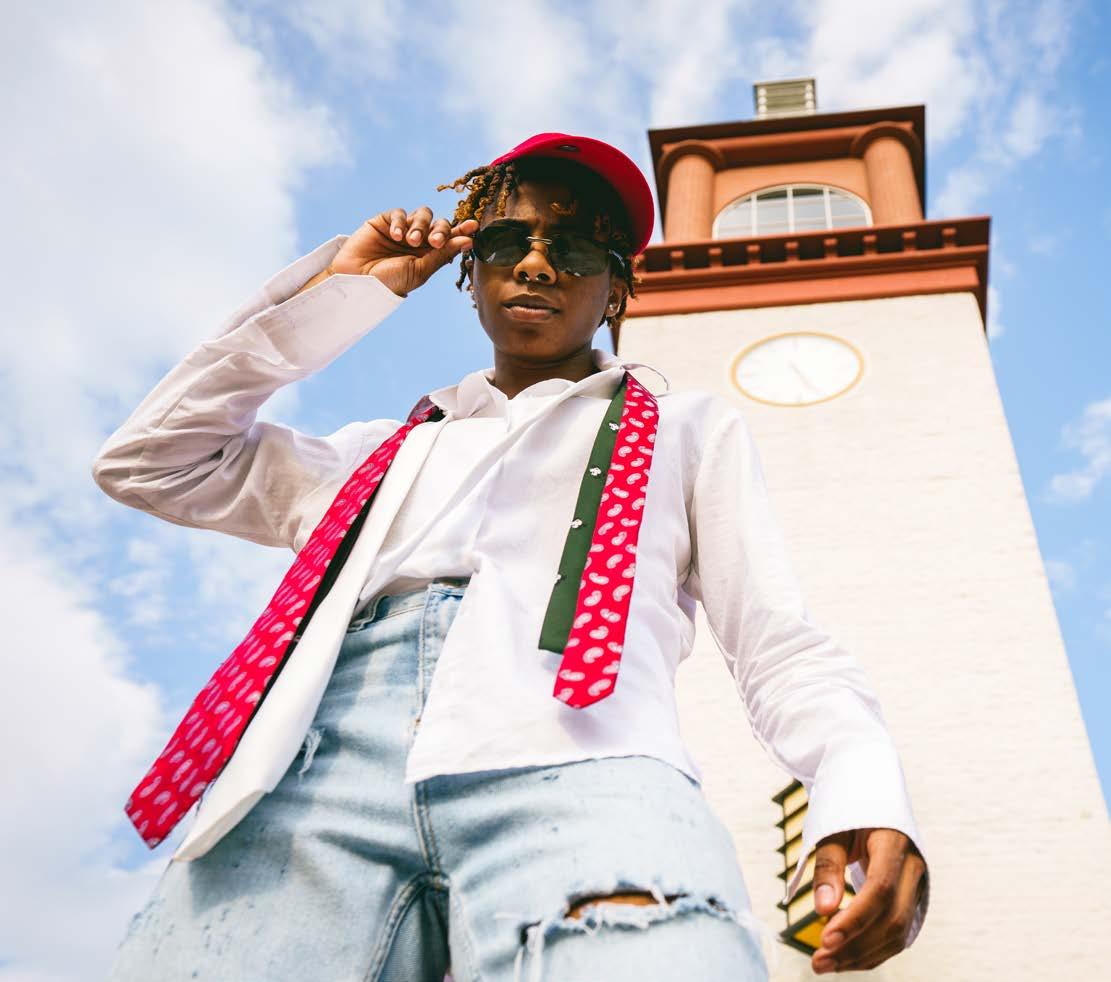
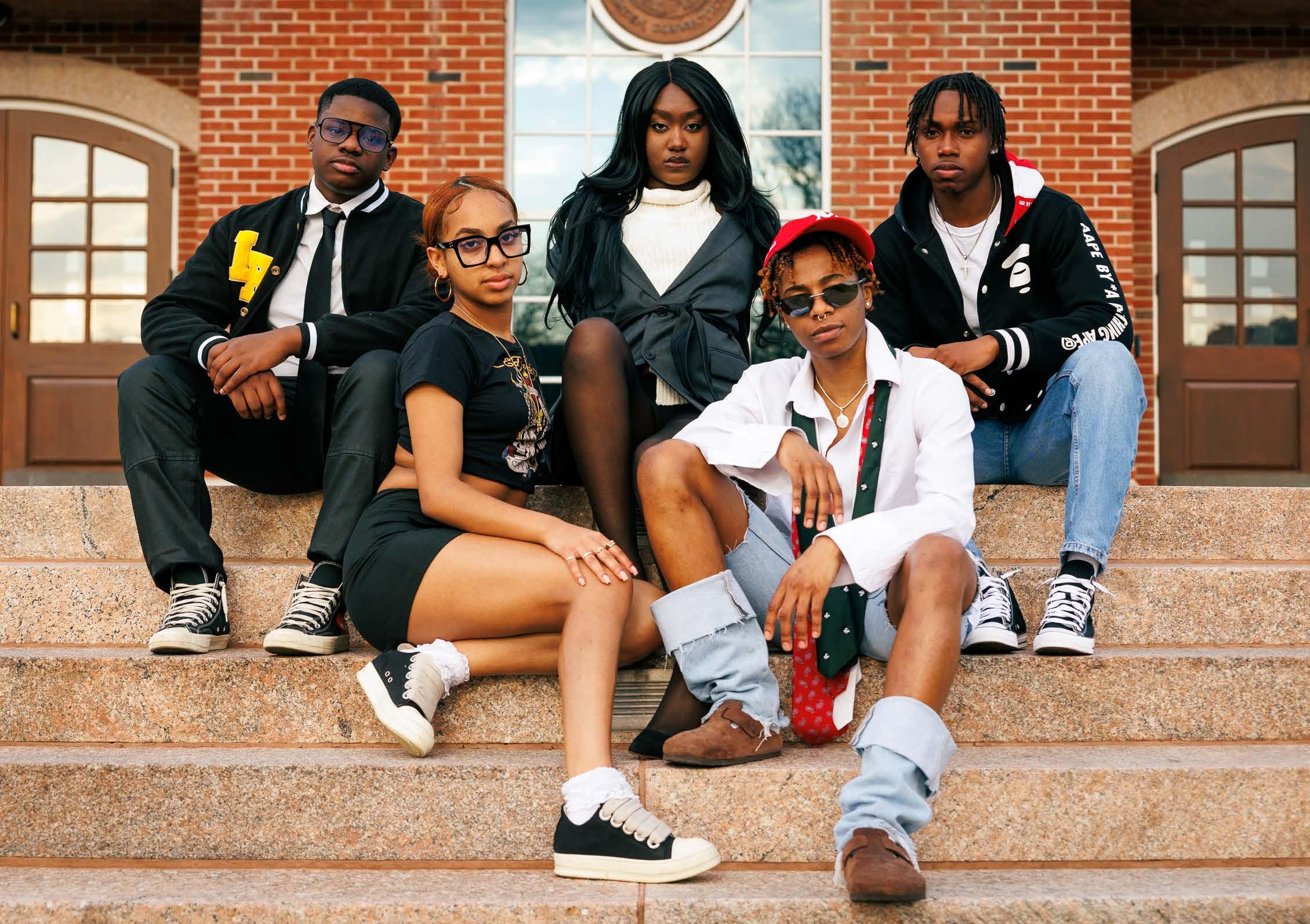
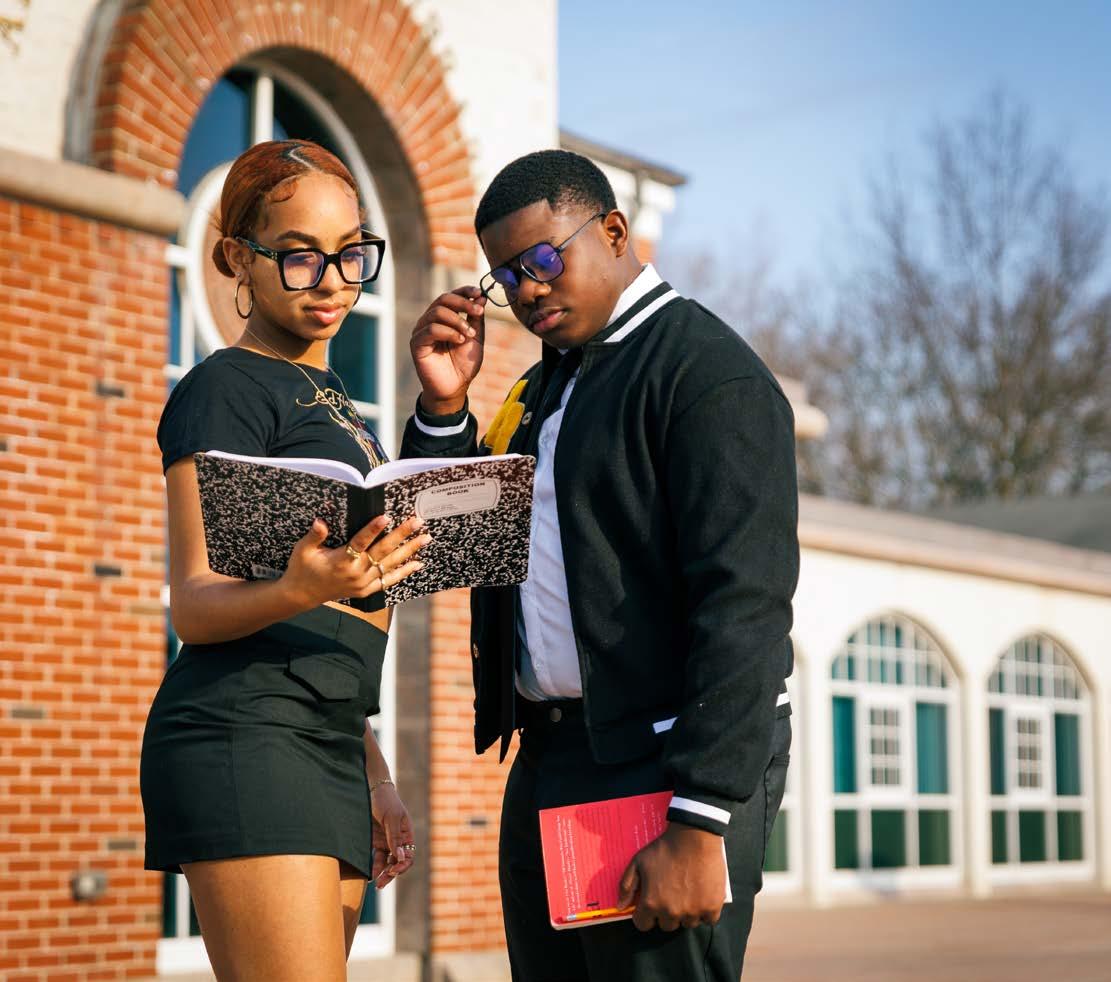
31
Best Dressed





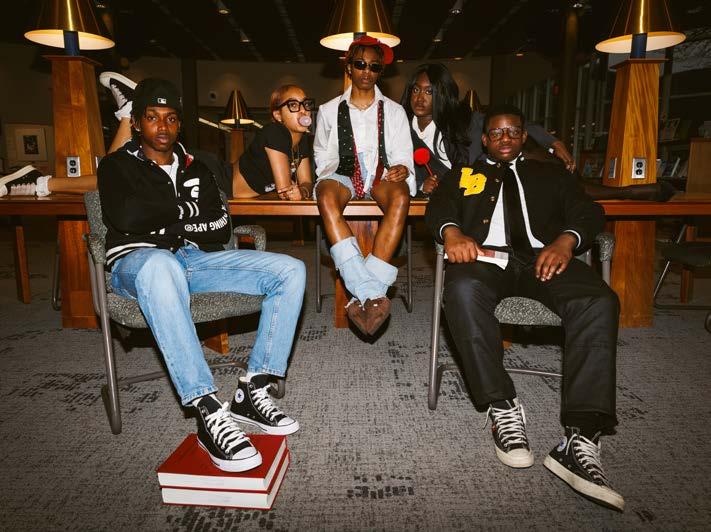

32
PARTICIPANTS: Dior Barnes, Jason Budhai, Kayla Duncan, Lesley Gaillard, Yealie Ulaba-Samura
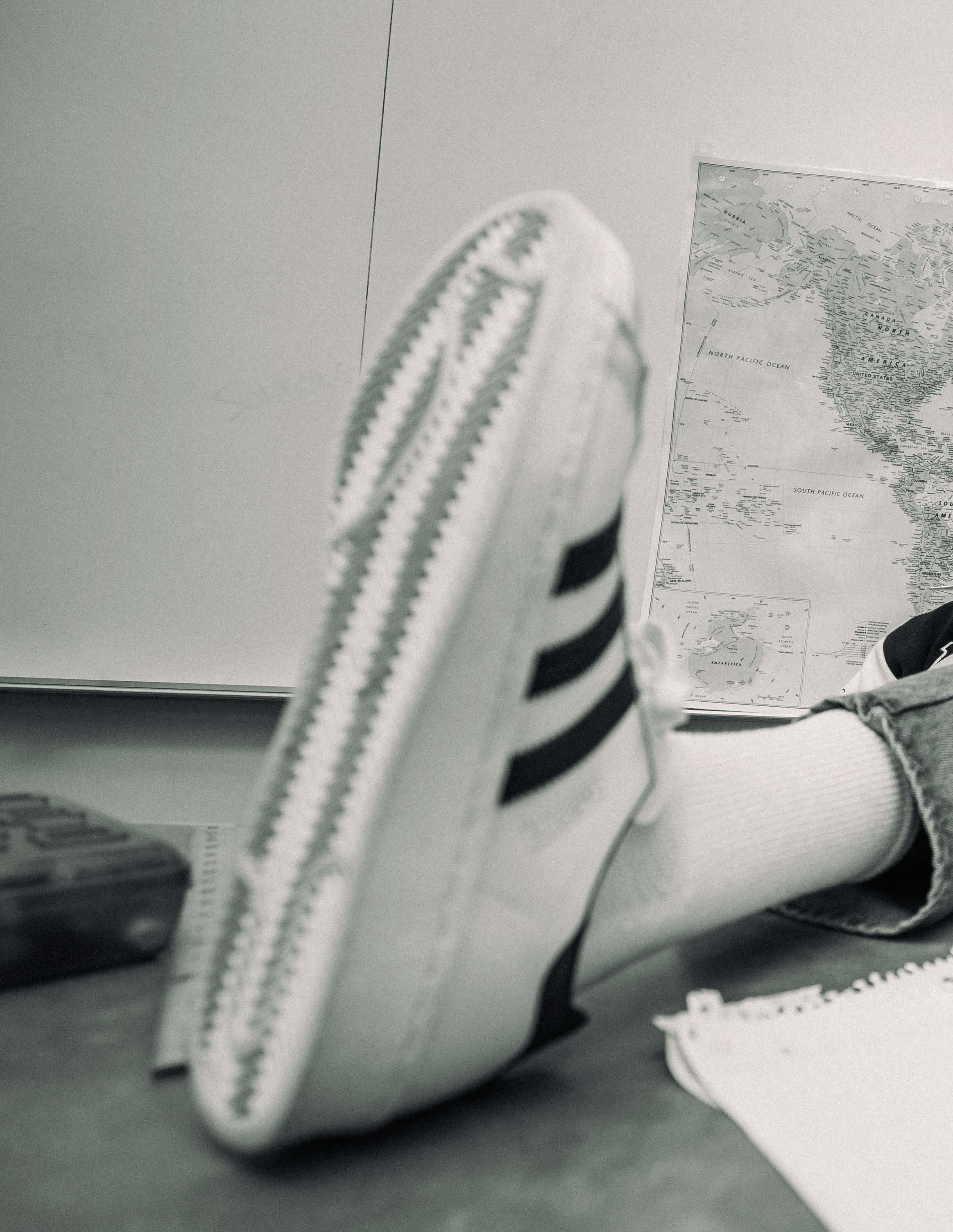
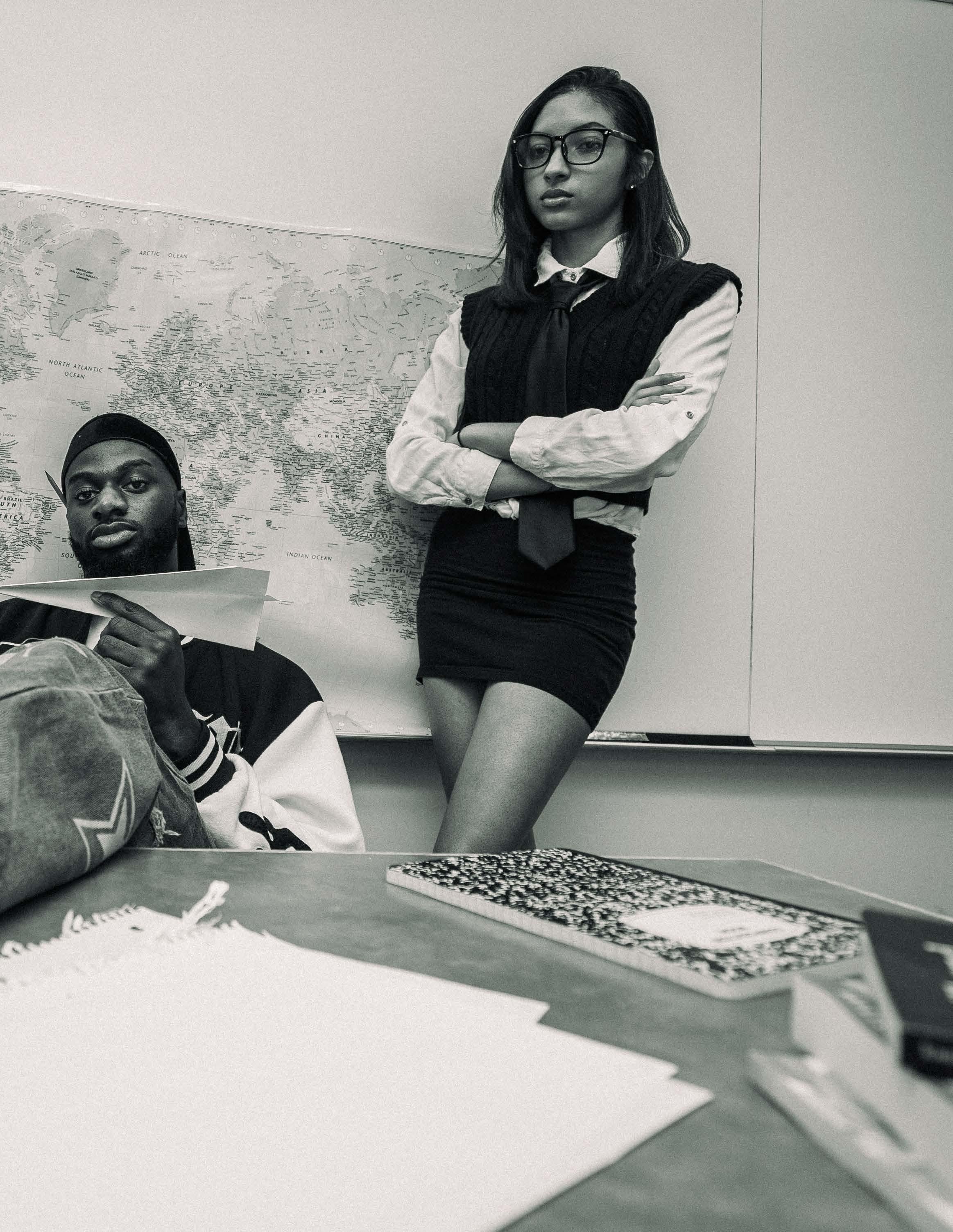







































 By: Aidan Sheedy
By: Aidan Sheedy








































